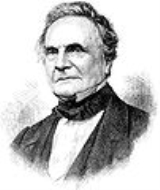
(26 December 1791 – 18 October 1871) was an English
mathematician, philosopher, inventor and mechanical engineer who originated the concept of a programmable computer. Considered a "father of the computer", Babbage is credited with inventing the first mechanical computer that eventually led to more complex designs.
Parts of his uncompleted mechanisms are on display in the London Science Museum.
On two occasions I have been asked,—"Pray, Mr. Babbage, if you put into the machine wrong figures, will the right answers come out?" In one case a member of the Upper, and in the other a member of the Lower, House put this question. I am not able rightly to apprehend the kind of confusion of ideas that could provoke such a question.![]()
The whole of arithmetic now appeared within the grasp of mechanism.![]()
As soon as an Analytical Engine exists, it will necessarily guide the future course of the science. Whenever any result is sought by its aid, the question will then arise — by what course of calculation can these results be arrived at by the machine in the shortest time?![]()

